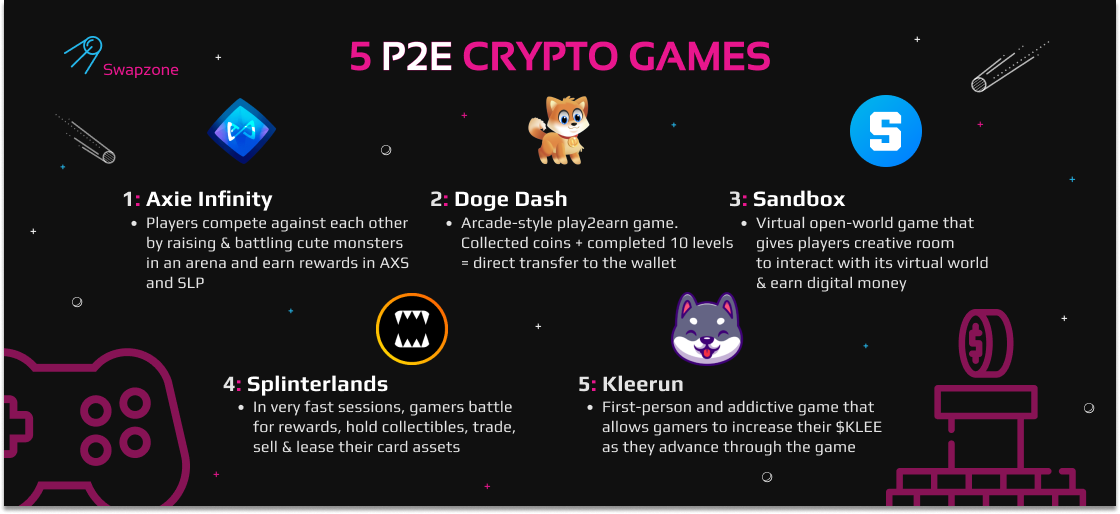Why Play-to-Earn Incentives Are Changing the Means You Play and Earn
The introduction of play-to-earn models represents a notable change in the gaming landscape, welcoming players to discover not only the entertainment worth of games however also their prospective as income-generating platforms. This paradigm supplies diverse advantages, including possession ownership with blockchain modern technology, which essentially modifies player involvement and investment. Nonetheless, as this design progresses, it presents a special collection of challenges that might impact its sustainability and charm. Recognizing these dynamics raises significant questions regarding the future of pc gaming and the effects for both players and developers alike.
Emergence of Play-to-Earn Models
In recent years, the gaming industry has witnessed a significant transformation with the emergence of play-to-earn models, fundamentally altering how gamers involve with electronic atmospheres. This ingenious technique enables players to gain substantial benefits with their in-game activities, creating a change from typical pc gaming standards where pleasure and competition were the primary motivations.
Play-to-earn versions utilize blockchain innovation and non-fungible tokens (NFTs) to offer players with possession of in-game possessions, which can be traded or cost real-world currency. As an outcome, players are incentivized to invest effort and time right into games, fostering a feeling of company and financial possibility. play to earn rewards. This change has brought in a varied gamer base, consisting of those who might have formerly seen gaming as a totally leisure activity
A number of platforms have actually emerged, showcasing effective applications of this model, such as Axie Infinity and Decentraland. These systems have not only created considerable income yet likewise triggered discussions around the sustainability and ethics of such financial systems. As play-to-earn models proceed to develop, they assure to redefine the connection in between players, programmers, and the broader electronic economic climate, leading the way for a brand-new era in video gaming.
Benefits for Gamers
As gamers engage with play-to-earn designs, they unlock a variety of advantages that extend past mere enjoyment. One of the most substantial advantages is the capacity for economic rewards. Unlike typical gaming, where players spend money and time without concrete returns, play-to-earn systems permit players to earn copyright or in-game possessions that can be transformed to real-world value. This economic reward not just improves engagement yet also promotes a feeling of possession over the gaming experience.
Furthermore, play-to-earn designs promote community building among gamers. Players usually collaborate to attain common objectives, consequently cultivating social connections that enrich the total experience. This feeling of neighborhood can cause cooperative gameplay, where players share strategies and sources, boosting both personal and group achievements.
In addition, these versions can equalize access to gaming by permitting gamers from diverse financial histories to benefit monetarily. By joining play-to-earn ecological communities, people can acquire skills and expertise regarding blockchain technology, more expanding their profession opportunities in the expanding digital economy. Inevitably, the benefits for players prolong well beyond gameplay, influencing their social, pop over to these guys economic, and instructional landscapes positively.
Challenges in the Ecological Community
While the play-to-earn ecosystem provides substantial chances, it is not without its i was reading this difficulties. Fluctuations in value can prevent potential players that look for steady revenue streams.
Another difficulty is the threat of scams and deceptive schemes that can plague the community. Gamers might encounter deceptive platforms assuring high rewards however eventually bring about financial loss. Making sure trust and security is important for the long-lasting feasibility of play-to-earn versions.
Moreover, the environmental influence of blockchain pc gaming can not be overlooked. The energy consumption associated with mining and transaction handling elevates moral concerns regarding sustainability. Video game designers must discover an equilibrium between satisfying gamers and lessening environmental footprints.
Lastly, the regulatory landscape is still developing, positioning potential risks for programmers and players alike. Uncertain legal frameworks can prevent technology and restrict the development of play-to-earn environments. Attending to these difficulties is necessary for recognizing the full potential of this transformative video gaming paradigm.
The Role of Blockchain Technology
Blockchain modern technology works as the backbone of the play-to-earn ecosystem, addressing a lot of the difficulties previously laid out. By using decentralized ledgers, blockchain ensures openness and safety in transactions. Gamers can with confidence earn and trade in-game assets, recognizing that ownership is proven and not subject to manipulation.

Tokenization of assets plays a critical function, providing players real ownership of their in-game things, which can be purchased, click here for more marketed, or traded on various industries. This encourages a vivid secondary market, where gamers can monetize their abilities and time invested in the video game.
Moreover, blockchain innovation enables interoperability between different video games and platforms, enabling players to carry their possessions throughout various ecological communities. This versatility not just enhances individual experience yet also promotes a much more comprehensive gaming environment, eventually improving the landscape of gaming and earning.
Future Trends in Video Gaming
The pc gaming sector is on the brink of a transformative development, driven by arising modern technologies and shifting player expectations. As play-to-earn designs gain grip, gamers are increasingly seeking immersive experiences that blend amusement with concrete benefits. This change is motivating programmers to introduce, concentrating on creating engaging gameplay that fosters community and interaction.
One significant pattern is the assimilation of digital fact (VIRTUAL REALITY) and augmented reality (AR), improving the video gaming experience by supplying much deeper immersion and interactive atmospheres. Furthermore, improvements in expert system are making it possible for extra innovative non-player personalities (NPCs) and flexible gameplay, customizing experiences to private player preferences.

Conclusion
In conclusion, the play-to-earn model is considerably transforming the video gaming landscape by allowing players to acquire real-world worth from their in-game tasks. This standard change not just improves player engagement and financial investment yet additionally elevates obstacles that should be dealt with to make certain sustainability within the ecosystem. As blockchain technology remains to assist in ownership of digital properties, the future of video gaming promises more advancement and chances for gamers across varied backgrounds.
Comments on “How to play to earn rewards: easy-to-follow guide for new gamers”